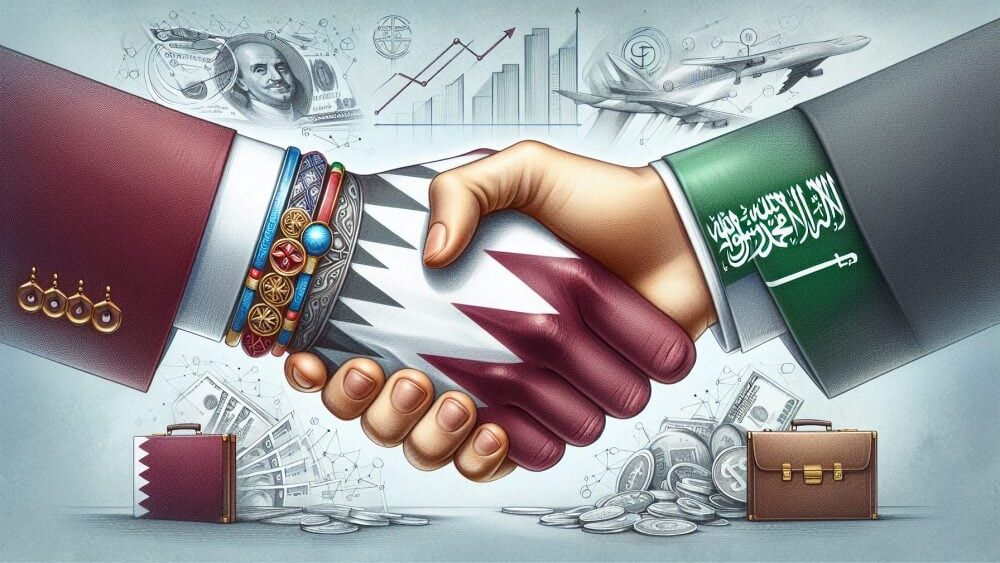Saudi Arabia and Qatar Strengthen Bilateral Ties Through Strategic Council Meeting
Doha, In a pivotal step towards deepening regional partnerships, Saudi Arabia and Qatar held a high-level meeting of the Saudi-Qatari Coordination Council’s executive committee in Doha. The meeting was jointly led by Saudi Foreign Minister Prince Faisal bin Farhan and Qatari Prime Minister and Foreign Minister Sheikh Mohammed bin Abdulrahman bin Jassim Al-Thani, emphasizing the commitment of both countries to build stronger, forward-looking diplomatic and economic ties.
This meeting comes at a crucial time, as the Gulf region continues to work towards greater unity, diversification of economies, and strategic partnerships across multiple domains.
Focused Discussions on Key Sectors
The agenda of the meeting was comprehensive, covering critical areas such as energy cooperation, tourism, sports, culture, and mutual investment opportunities. Delegations from both sides reviewed the progress of previously signed agreements and examined the implementation of projects aimed at economic integration and social development.
Saudi Arabia, through its Vision 2030 framework, and Qatar, under its National Vision 2030, are both undergoing rapid transformations. The leaders agreed that closer cooperation between Riyadh and Doha could significantly accelerate the success of these long-term plans.
“We are witnessing tangible progress in our collaboration, particularly in joint investment ventures and tourism development,” said Prince Faisal bin Farhan. “There is a shared ambition to build a more prosperous future, not just for our countries but for the entire region.”
The meeting also saw both sides exploring joint efforts in renewable energy, digital transformation, education, and infrastructure development, reflecting a modern approach to Gulf relations beyond traditional sectors like oil and gas.
Commitment to Shared Interests
Sheikh Mohammed bin Abdulrahman highlighted the strategic importance of the council, calling it “a platform for practical cooperation and aligned interests.” He added that the deepening partnership reflects not only mutual trust but also a shared vision for the region’s future.
The leaders stressed the importance of institutionalizing collaboration by forming task forces and technical teams to monitor progress across sectors. This structured approach ensures accountability and allows for timely follow-up on key decisions.
“The Coordination Council is more than a diplomatic forum; it is an engine for real results,” Sheikh Mohammed remarked. “Our unity is our strength, and this meeting is a testament to that.”
Diplomatic observers noted the friendly and proactive tone of the discussions, signaling a new chapter in Gulf relations following past tensions that strained Saudi-Qatari ties.
Regional Implications
The significance of this meeting extends beyond bilateral relations. Analysts see it as a reaffirmation of Gulf Cooperation Council (GCC) solidarity, especially in the face of regional challenges, including economic diversification, security cooperation, and climate change.
Since the 2021 Al-Ula declaration that officially restored relations between Saudi Arabia and Qatar, both countries have taken steady steps to rebuild trust. This executive committee meeting is the latest milestone, reaffirming that regional cooperation is not only possible but essential.
“As the global geopolitical landscape shifts, it is more important than ever for Gulf nations to present a united front,” said a regional affairs expert at the Doha Institute. “What we saw in this meeting is not just diplomacy—it is strategic alignment.”
The collaboration could also support wider Arab world goals, including more coordinated policies on foreign investment, supply chains, food security, and digital infrastructure.
Looking Ahead: A Blueprint for the Future
Both sides expressed optimism about the next phase of Saudi-Qatari relations. Plans are underway to launch joint cultural festivals, sports tournaments, academic exchange programs, and joint business councils to enhance people-to-people ties and business connectivity.
Additionally, the countries are exploring cross-border tourism packages, joint visa facilitation for international visitors, and infrastructure linkages that would make travel and trade easier across the Gulf region.
“This is just the beginning,” said a senior Saudi official involved in the talks. “We are building a foundation that future generations will benefit from. Cooperation is no longer optional—it is a strategic necessity.”
The next executive committee meeting is expected to be held in Riyadh, where both countries will review the deliverables discussed in Doha and formalize new agreements based on the progress made.
Conclusion
The Doha meeting of the Saudi-Qatari Coordination Council marks a new era in Gulf relations, one that prioritizes partnership over rivalry and cooperation over conflict. By aligning their goals and resources, Saudi Arabia and Qatar are setting an example for the region—showing that shared ambitions, mutual respect, and strategic dialogue can lead to lasting progress.
For more information click here
Qatar’s Ashghal Set to Award Major Healthcare Design Contract Soon



